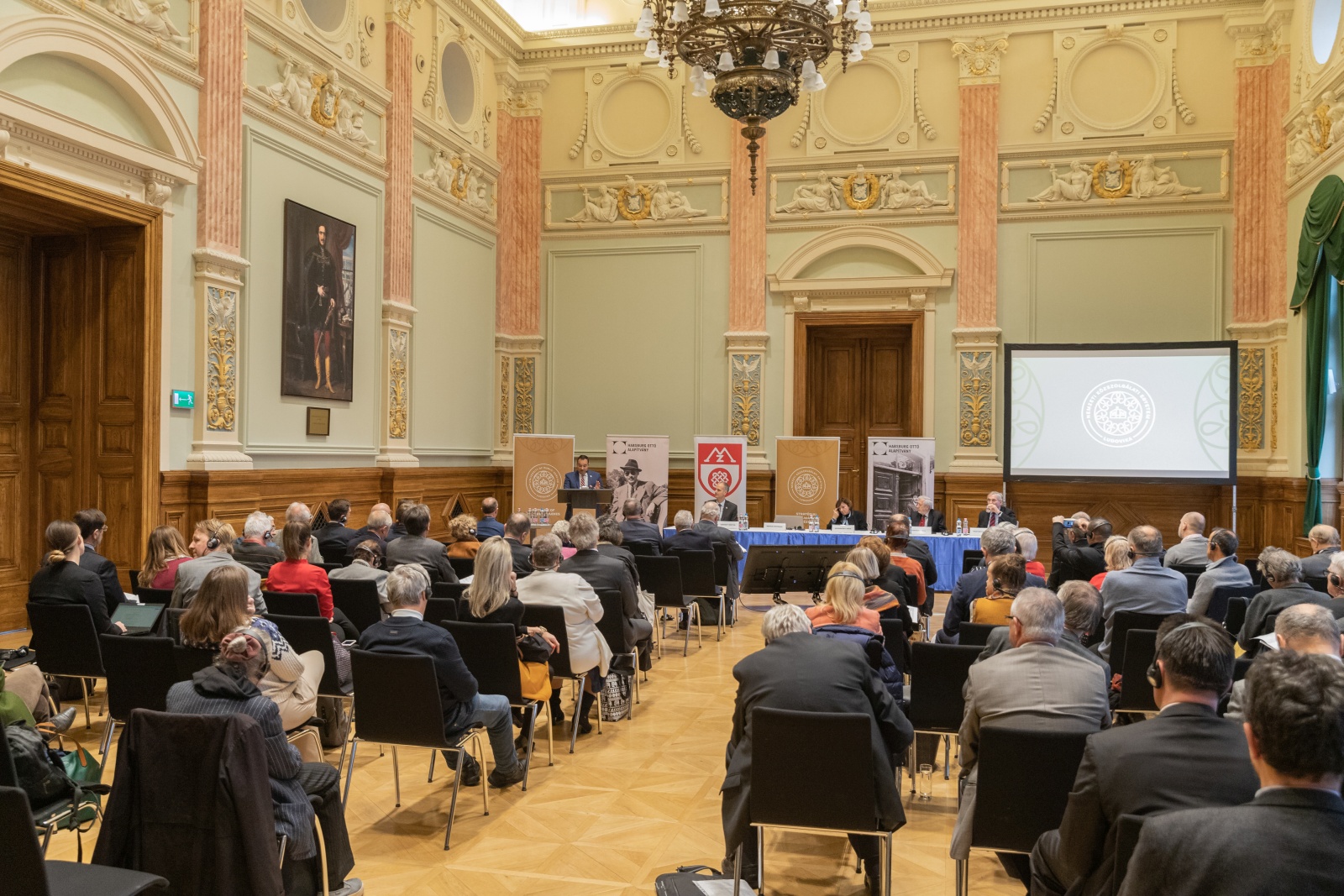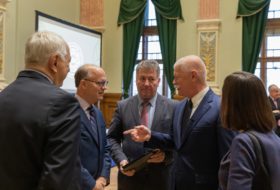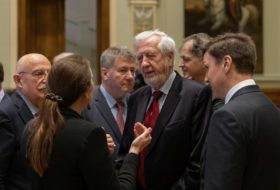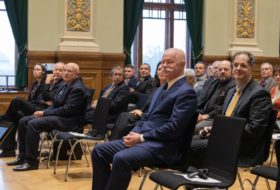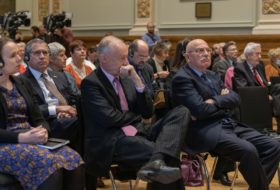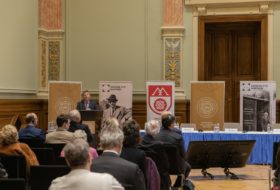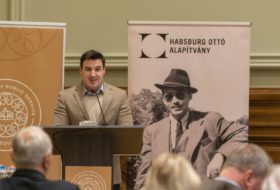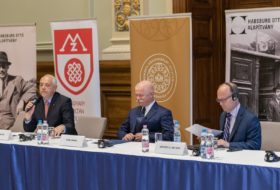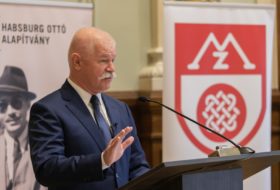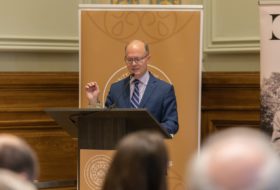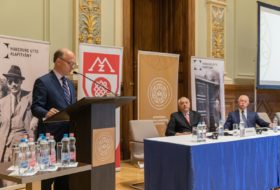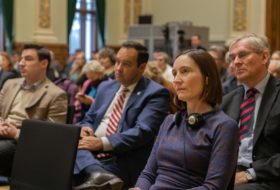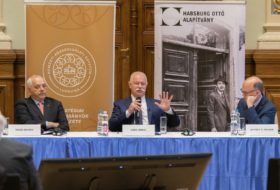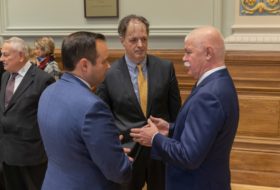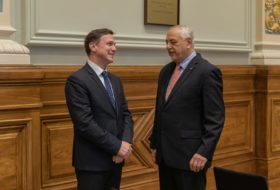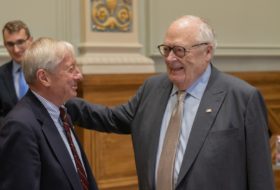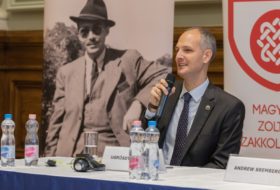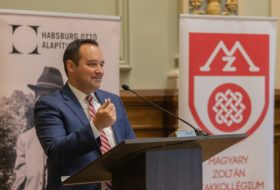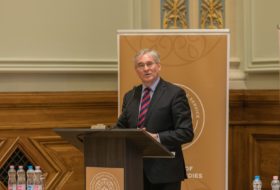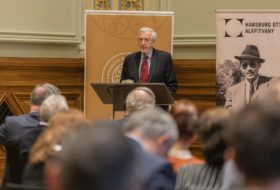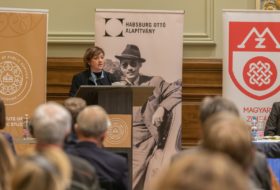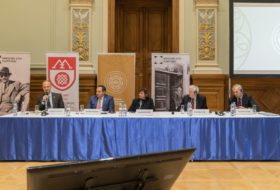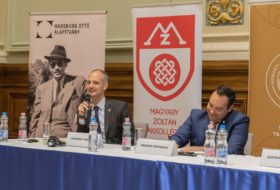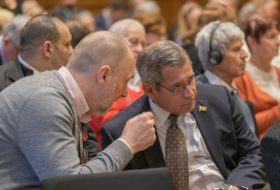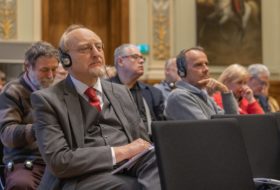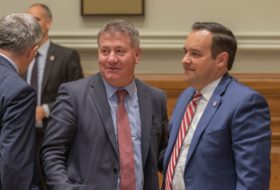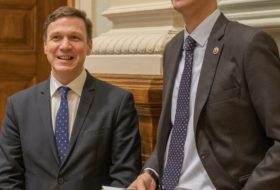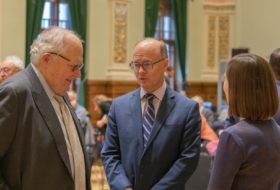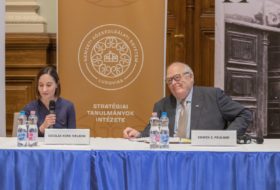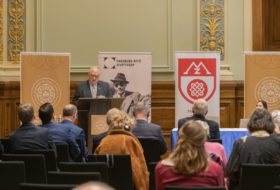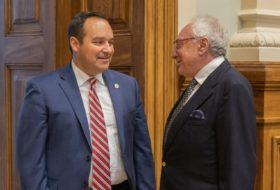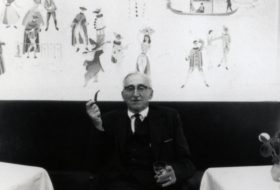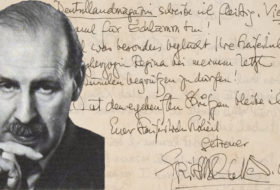The participants of the conference, jointly organised by the Otto von Habsburg Foundation (HOAL) and the National University of Public Service (NKE), were welcomed by Gergely Prőhle, Director of the Foundation. In his introduction, he recalled that the idea for the meeting arose during Edwin J. Feulner’s visit to Budapest two years ago when the American thinker was given a letter addressed to Otto von Habsburg, written by him in 1965 and now part of the Foundation’s collection. In his letter, the 24-year-old student requested a meeting with the politician who lived in Pöcking. The former heir to the throne replied by return of post, warmly welcoming him, and thus began a personal relationship that lasted until Otto’s death and later developed into a working relationship and friendship. For the occasion, some of the documents from this association were on display for the public to see. Gergely Prőhle opened the conference by referring to the centuries-old, almost indivisibly complex system of relations between the two continents regarding the ideological history and foreign policy, following the example of the eponym of our Foundation.
Balázs Mártonffy, head of the American Studies Institute at the NKE, assessed the current world situation as the unipolar world order, which was born in 1992 with the defeat of Communism and the dissolution of the Soviet Union, has been living its final hours since 2014. This year has seen two events that have profoundly impacted our lives: In Beijing, representatives of more than 50 countries signed a document establishing the Asian Infrastructure Investment Bank; and Russia annexed Crimea from Ukraine. The expert believes systemic issues dominate transatlantic relations in the current post-unipolar situation. The United States needs to find answers to three problems. China’s revisionist hegemonic ambitions, whose effects are now being felt not only in the region of the Pacific but worldwide, and to which it is trying to respond by the tactic of transferring the leverage of its actions. In the case of Russian aggression, by supporting Ukraine, a country that will soon become an important new pillar in the geopolitical strategy-building process. Finally, it needs to rethink its role in the world: in the last 30 years, it has considered the politics of interest to be outdated and has abandoned it, but since then, new players have emerged in world politics; its society is divided to an unprecedented degree, and the current generation is faced with the unusual phenomenon of living worse than its parents’ generation. The combination of these challenges can change the whole conceptual framework.
One cannot live without ideals – János Csák reminded in his lecture. Hungary’s Minister of Culture and Innovation, former Ambassador to the United States, said that the American ideals of freedom, equality before the law and justice embody the most beautiful ambitions of man’s life on earth and are the most in harmony with human nature. The speaker, who recently dedicated a book to the “American genius”, warned that the founding fathers 250 years ago built the community on a foundation of virtues derived from religion and morality while integrating the classical Greek, Jewish and Roman traditions, as well as the achievements of British and French philosophical and political thought. “If we betray God, and he withdraws his support from us, we shall dishonour every true servant of God and be deprived of all we possess,” he quoted a preacher from 1630. Csák sees some of today’s American conservatives as living under the spell of producing and possessing material goods, forgetting Socrates’ admonition, “Virtue is not made of wealth, but virtue becomes wealth.” However, the development of personality can only come through healthy human relationships and, above all, through a model family environment and an institutional upbringing. The social experiments of radical modernity – or at least the examples that appear to confirm this – do not reinforce the virtuous approach to life that is regarded as the conservative Foundation. We (Central) Europeans would nevertheless be wise to follow developments in the American continent closely because “the film about the future of Europe is playing out today”.
The consciousness-raising of the intellectual American conservative movement was Russell Kirk’s book, The conservative mind, published in 1953. From Edmund Burke to George Santayana, its author surveyed all the thinkers – John Adams, Alexis de Tocqueville, Benjamin Disraeli – from whom the self-identified conservative American of the mid-20th century could learn, gather ammunition and gain encouragement. Jeffrey O. Nelson, Director of the Russell Kirk Center for Cultural Renewal (Mecosta, Michigan) and also the son-in-law of the scholar, gave a lecture reconstructing what Kirk meant by the term he popularised; whom he considered conservative; and with whom he felt a close kinship with (among them several European immigrants: Leo Strauss, Friedrich von Hayek and our compatriots John Lukacs and Thomas Molnar). Burke’s figure and ideas had the most significant influence on him, so much so that he sought to promote the dissemination of the 18th-century politician’s views through the society named after him (in Chicago and later in Salzburg). Kirk’s Europe was thus a Europe of European thinkers: their intellectual interaction led to transatlantic ties, with which they shared the discovery and understanding of Christian civilisation, common culture, customary law and transcendence. In the speaker’s witty conclusion, Kirk is immortal not for what he did but for what he thought.
In the conference’s block focusing on foreign policy issues, Andrew Bremberg, Executive Director of the Victims of Communism Memorial Foundation and former US diplomat, started the panel. His speech focused on the Russian-Ukrainian war, in which he described the assistance to Ukraine as an expression of transatlantic solidarity. On the role of the United States, he said that conservative public opinion is not united in setting the agenda and is only likely to intervene decisively in the diplomatic process when Russia signals its desire for peace. Bremberg sees traditional American conservative politics returning to the metaphor of the three-legged stool, whose stability can be guaranteed by the principles of economic liberalism, cultural conservatism and anti-communism, which has become topical again in the face of the threat from China.
How Europe fits into the changing foreign policy of the United States has already been analysed by Tamás Magyarics. The historian-diplomat sees the “Copernican turn” at the end of the Second World War, at the end of which the overseas power – breaking with the practice followed until then – did not withdraw from the Old Continent, in other words, it switched from off-shore balancing to on-shore balancing. After 1990, the parties found it difficult to break with Cold War habits, and in NATO-US conflicts, Europe was mainly assigned the role of soft power, which meant encouraging nation-building efforts. But the informal principle of the North Atlantic Treaty Organisation has not, unfortunately, lost its validity: keep the Americans in, the Germans down, and the Russians mostly out. The stakes of the Russia-Ukraine conflict, the expert says, are the extent to which Europe can be valued in the eyes of the United States and become an equal partner in the near future.
Géza Jeszenszky, former Foreign Minister and diplomat, spoke about our region’s path to NATO accession and the challenges of today. He called the stability and security that the joining would bring a clear advantage, and the Russian fears that the spread of Western influence would paralyse and sell out the country were unfounded. Whereas in 2014, during the Crimean crisis, many accused it of inaction, the attack on Ukraine restored faith in the military alliance – best demonstrated by Finland and Sweden’s applications for membership – meaning that NATO still has a place in geopolitical thinking about our region.
Réka Szemerkényi summarised the geopolitical lessons of a war not far from our borders. According to the former State Secretary and former Ambassador, in light of the events, we must first rethink our earlier ideas about the Russian army (logistics, air force, casualty rates), and they must do the work themselves. China’s attitude ranges from initial tacit support for Russia’s moves to open criticism, including from the German Chancellor. In the case of Ukraine, what is most striking, apart from the losses, is the dangerously mature identity and the awakening to their strength. On the European Union’s side, she saw the relatively swift and united action against the aggressor as a prominent positive. All of this suggests that the transatlantic system has been strengthened, enlarged, and able to ally with others and that there has been progress in the the willingness of member states to cooperate.
The guest of honour at the conference was Edwin J. Feulner, founder of The Heritage Foundation, who has led the conservative US think tank for nearly four decades. Feulner recalled his meeting with Otto von Habsburg – which led to a thought-provoking paper, The effects of Communism on cultural and psychological politics in Eastern Europe – and drew attention to the plural in the event’s title, “each conservative is conservative in the field he knows best” (Robert Conquest).
Photos: Márton Ballagó
